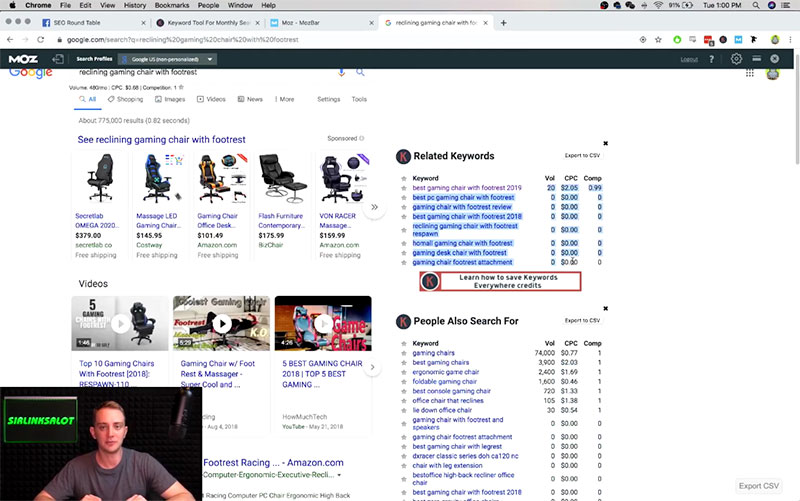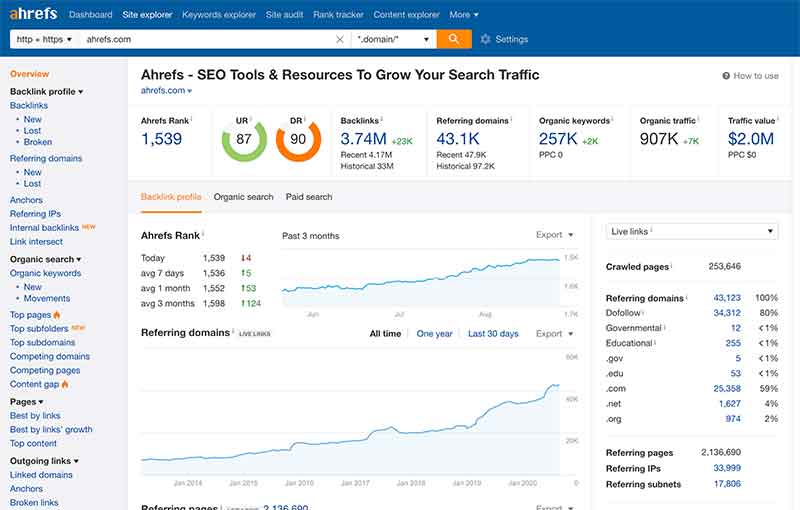How to do Niche Research (Guide to Finding Profitable Niches)
Join the 1,000+ brands that trust us for their link building.
These days, many people want to know how to make money through e-commerce or affiliate marketing.
The idea of building a profitable business can be very tantalizing due to the possible benefits: working from home (or from a beachside resort), earning a passive income, being your own boss, and so on.
Going into a niche business is one way to turn your great idea into a real money maker. The question is, which niche is the best fit for you?
The answer differs from person to person. The important thing is that choosing the right niche may be the deciding factor on whether your business succeeds or fails.
That’s why niche research is vital for the growth of your business in its early stages and for the long term. Knowing what the playing field is like before you decide to play makes the difference between winning and losing.
It’s that simple – so let’s dive into this a bit deeper to make sure you get off to a good start!
What is a Niche?
Before we discuss niche research further, let’s start with what defines a niche.
A niche is a segment of a market that targets a particular audience. For example, drinking straws is a general niche that can contain several small niches, such as cartoon character-themed straws or edible straws.
The edible drinking straw is a specialized product and the market for it would be less competitive compared to the general plastic drinking straw market. Due to this, the target audience for this item is more specific, for example, people who are environmentally conscious.
Small niches generally have fewer customers and suppliers compared to larger niches (and are targeted by local lead gen techniques). On the other hand, smaller niches benefit from less competition which can mean a greater demand for your product or service.
How to Find a Good Niche

Finding a niche can be as simple as deciding what to sell and taking the necessary actions needed to put your ideas into action. On the other hand, it takes considerably more resources, time, energy, and money to find a profitable niche for long-term success.
The more thorough the research is, the more knowledgeable and less risky your venture into niche markets is (especially for highly competitive niches like real estate or online gambling that require a lot of links). In this article, we’ll get into the core aspects of niche research that are crucial in your desire to find a good, profitable niche.
We’ll also discuss the importance of focusing on your goals (realistic vs. ideal) and the importance of analyzing the online market, such as identifying potential competition, current trends, and steady growth sectors.
We’ll then touch on how to find the right products for your business, whether you decide to sell them or market them.
Rounding out this article will be a discussion on establishing long-term goals and researching pain points. Hopefully, by the end of this article, you will be on your way toward finding a niche that is both profitable and fulfilling.
Passion Vs. Money
Before you begin your journey, you should have a notion of what type of niche you want to enter. Will you be entering the products and services market or perhaps become a purveyor of information? Make a list of things you like to help you decide which niche is right for you.
As you make your list, think about the reasons for going into a niche business. Do you simply want to make money, fulfill a personal goal, or help other people?
Don’t forget to consider your potential audience. The audience associated with your niche will be around long after a trendy product comes and goes. Stay in tune with the needs of your customers at all times.
Whichever direction you take, being passionate about your niche can be extremely helpful. Your passion will help you stay motivated and committed throughout the process of running a business, especially if you are doing all the content yourself!
That being said, having a passion for your niche is not a prerequisite for success. There are plenty of entrepreneurs who have profitable niche businesses without a clear passion for the niche. You can always hire knowledgeable writers to do your content writing for you.
Do You Need to Be an Expert?
You want to get into a profitable niche market, but you don’t know much more than the average customer on the subject. Do not let this intimidate you. It’s easier than you think to become a credible authority on most subjects.
Set a realistic goal, such as “I’m going to be an expert in X in 1 month”. You should then begin researching your subject by reading books or online material. Stay on track by eliminating barriers or distractions to learning. Then, practice what you’ve learned and evaluate the results.
Knowing your target audience should give you a sense of the level of expertise you should have. Stay connected with your level of expertise and avoid marketing to others who are knowledgeable about your niche.
Don’t be afraid to team up with like-minded people in your niche. Partner with other people or hire them for their expertise while you focus on other segments of your business.
Put in the necessary work to make sure the products you sell or the content you produce is of the highest quality possible. Don’t take shortcuts. Without adherence to quality, your credibility and/or authority might come into question, which could be disastrous.
You don’t need to be an expert on your niche, but it is certainly helpful. Either put in the work to gain expertise or hire those that already have extensive knowledge.
Define Your Goals and Realize Your Limitations

Let’s talk about the scope of your business. What do you want and how can you avoid overextending yourself to get it?
A very important thing to consider is the size of your niche. Larger, more general niches are usually more competitive and costly to enter. Smaller niches are usually less competitive (and potentially less profitable) and easier to break into.
Time is another consideration. How much time do you have to invest in the project you’re working on? Larger projects for more general niches will take substantially more time than smaller, more niched-down projects due to the sheer amount of quality content that will need to be created.
Also, think about the cost. How much are you willing to sacrifice for the sake of your passion? A larger niche is more expensive and time-consuming to maintain (think about the amount of content to create, backlinks to buy or work for, and so on), but can yield greater profits.
Make the most accurate assessment possible of your goals and your limitations. Otherwise, you are liable to bleed money, lose motivation and fold before you really start to see results. Take it slow and steady, but not too slow.
Do Some Keyword Research

It’s extremely important to know what keywords your target audience uses to search for information or items related to your niche market.
Understanding this puts you in touch with what they like and how they search for it, thereby giving you valuable knowledge to aid you in growing your niche.
To find a profitable niche, do extensive keyword research. Type in keywords into a search engine and analyze the results. Some things you will want to look at are:
- The number of pages heavily targeting the keyword (see: allintitle keyword research)
- What kind of sites/pages rank high on the list (niched down sites? authority sites?)
- The search volume of the keyword term
- Related keywords to that term you hadn’t thought of before
- The CPC (cost-per-click) of the keyword
Keyword research will give you a lot of useful information about the overall level of competition you can expect. We like to use a tool called Keywords Everywhere, and you can learn more about how we use this tool here.
Highly competitive keywords and high search volumes often translate to a highly competitive niche that will take extra time and money to make profitable, so beginners may want to avoid them.
When writing articles, keyword research can help guide you on which articles to write and how many articles your site will need to target particular keywords in order to lure the most traffic to your site.
Analyze the Competition

Finding a niche that is profitable should include learning about the existing competition. Know who you are up against before you fully commit.
The results from a keyword search on Google are separated into two categories, paid results and organic results. Among the organic results list, pay attention to the sites that rank at the top. You should aim to be included at the top of this list.
Use tools such as Ahrefs or an alternative to get a comprehensive profile of your competitors. Some things you will want to pay attention to are:
- The size of their sites (how many pages are indexed)
- The authority of the sites
- The number of referring domains they have
- The quality of their backlink profiles
- The backlink profiles of individual pages you will want to beat out
Other relevant data worth a look at is high keyword difficulty and cost per click (CPC). A high keyword difficulty affects your ability to rank high on search engines, especially if your site is relatively new. Keywords with a high CPC are generally more competitive, both for ads and for organic rankings.
To go deeper into the overall traffic for a site, use a tool such as SimilarWeb to analyze the various sources of traffic (social media, email, referrals, etc.).
Other than studying numbers, take some time for content analysis. Do the most popular sites include quality information, images, and video? How long is their content and how good is it?
These are core elements of competition analysis. Know the marketplace for your niche so that you have the right tools to tackle the competition and rise to the top.
Research Current Trends
Competition analysis is great for gaining an understanding of the business environment in the present, but how about the comprehensive history of your niche? Has it hit its peak long ago or is it on a steady upward climb?
This is where putting in some time to study current trends can boost your chances of finding a profitable niche. Google Trends might be the obvious choice, but there are many other tools that are available and can offer other ways to research trends.
Looking at social shares is another way to track current trends. Trend tracking tools allow you to plug in a keyword or phrase that gives you trend data for that keyword from several social media sites for any time frame you choose.
The implication of trend research is simple: a declining trend means that traffic for your proposed niche is shrinking. You want to be in a market that is somewhat stable or is on the rise.
Researching current trends within your niche involves putting these tools to good use combined with staying on top of the news.
Find Products Worth Selling
Take the appropriate measures to research the available products within the niche you are looking into.
Other than selling the products of one or many companies, you can go into affiliate niche marketing where you provide links to other websites for a commission.
Take the time to find products that you think are genuinely worth selling. One place to start is our list of best affiliate programs.
You can also look at the top-ranking sites in the niche and see what products they are really pushing. There’s a chance that they are pushing those products for a reason!
Some things you will want to consider when judging the quality of a product for the purposes of selling are:
- The product’s price
- The product’s conversion rate
- How much money you can make per unit sold
- The reputation of the company/brand
- Access to sell that product
Whichever you choose, the focus should be on selling or marketing items that make money. Looking at products that solve problems, follow consistent trends, and satisfy guilty pleasures go a long way towards achieving this goal.
Plan for the Long Term

Putting in the requisite time, money, and energy to turn your passion into a profitable, long-term success story is the ultimate goal.
Short-term niches that rely on trends can be lucrative, but the risk and skill level required to run this type of niche is not recommended for beginners.
Look for evergreen niches for sustained profitability. These are niches that don’t rise and fall with trends. For example, love, money, health, and other hobbies. Tap into a niche with associated products that people will never lose their desire for, regardless of their condition and the world around them.
Familiarize yourself with whatever it is you are selling or doing marketing for so that you can become a reputable source, which will lead to repeat traffic and word-of-mouth advertising.
Whether you sell a product or do marketing for one, keep your options open. Don’t get locked into one particular type of product. Things can always change (ex: suppliers can cut rates) in ways that could drastically affect your company.
Try to Solve Problems People Have

Researching the pain points of your prospective audience can be a great way to uncover profitable niches.
Pain points are basically any issues or problems that customers have in their lives that they urgently want to solve.
Pain points can be divided into four main types: a need for productivity, money, personal improvement, or support.
For example, an evergreen niche such as health and a product such as a book on self-improvement addresses one of the four pain points – personal improvement.
Niches that address pain points can be extremely lucrative due to high demand and high conversion rates. These people want to solve their problems and solve them quickly!
Niche Research Wrap-Up
Finding a profitable niche is no simple task, but the rewards can be significant. It’s incredibly important to put some time into this task before getting started with your website or business.
Whether you are focusing on selling products or marketing them, being passionate about which niche you choose can be extremely helpful, but not completely necessary.
Niche research is also useful when searching for relevant, existing content on established websites that you want to use for curated link building.
Do not be discouraged about your lack of expertise. Take some time each day to gain a better understanding of your niche and its prospective customers, or hire people that are knowledgeable.
Know your limitations in terms of size, time, and cost associated with running your business, especially early on.
Do plenty of keyword research, which includes gauging keyword popularity, existing competition in your niche market, and trending opportunities.
Never be content with your success. Deliver consistent quality while keeping an eye on the road ahead.
We hope this guide helps you along your journey, and be sure to check out our list of 5 deadly digital marketing niches for beginners to stay away from.
If you have any questions or comments, please leave them below!
Contributing Author: Greg Reynaud
 Article by:
Article by:
Chris Tzitzis
Hey I'm Chris, one of the founders here at SirLinksalot. I'm into building internet money machines (affiliate websites) and specialize in building backlinks. Find out more about me and my link building team.
 Questions or Comments?
Questions or Comments?
We are active in our Facebook Group seven days a week and would love to hear from you. Ask us questions, learn from other group members, and share your knowledge.
Related Posts
Ready To Start Building Your Rankings?
Your link building journey to the top of Google starts today!
Apply for Managed Link Building to get a free analysis and game plan, or order backlinks a la carte.
Link building services that work.


